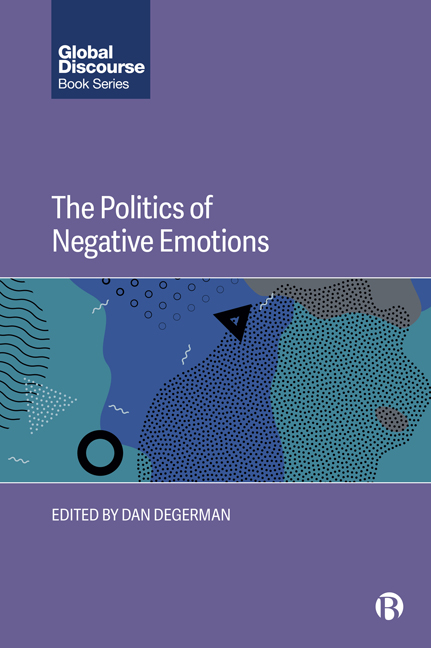Book contents
- Frontmatter
- Contents
- List of Figures
- Notes on Contributors
- Introduction: Feeling Our Way through Politics
- 1 Anger, Fast and Slow: Mediations of Justice and Violence in the Age of Populism
- 2 ‘We Will March Side by Side and Demand a Bigger Table’: Anger as Dignity Claim
- 3 Moving between Frustration and Anger
- 4 The Resentment– Ressentiment Complex: A Critique of Liberal Discourse
- 5 Green Shame: The Next Moral Revolution?
- 6 Against Comfort: Political Implications of Evading Discomfort
- 7 For Love and for Life: Emotional Dynamics at the World Congress of Families
- 8 The Functionality of Affects: Conceptualising Far-Right Populist Politics beyond Negative Emotions
- 9 Moral Economies of Exclusion: Politics of Fear through Antagonistic Anonymity
- 10 Contesting the Politics of Negative Emotions in Educational Policy Making: A Ban on Asylum Seekers’ School Visits in Finland
- Index
1 - Anger, Fast and Slow: Mediations of Justice and Violence in the Age of Populism
Published online by Cambridge University Press: 18 January 2024
- Frontmatter
- Contents
- List of Figures
- Notes on Contributors
- Introduction: Feeling Our Way through Politics
- 1 Anger, Fast and Slow: Mediations of Justice and Violence in the Age of Populism
- 2 ‘We Will March Side by Side and Demand a Bigger Table’: Anger as Dignity Claim
- 3 Moving between Frustration and Anger
- 4 The Resentment– Ressentiment Complex: A Critique of Liberal Discourse
- 5 Green Shame: The Next Moral Revolution?
- 6 Against Comfort: Political Implications of Evading Discomfort
- 7 For Love and for Life: Emotional Dynamics at the World Congress of Families
- 8 The Functionality of Affects: Conceptualising Far-Right Populist Politics beyond Negative Emotions
- 9 Moral Economies of Exclusion: Politics of Fear through Antagonistic Anonymity
- 10 Contesting the Politics of Negative Emotions in Educational Policy Making: A Ban on Asylum Seekers’ School Visits in Finland
- Index
Summary
We live, it has been said, in an ‘age of anger’ (Mishra, 2017). The rise of populism and cultural conflict in liberal democracies has been widely attributed to a heightened power of affect in public life, with resentment, hostility and rage playing a critical role in the mobilisation of support for the ‘hyper-leaders’ that drive nationalist parties (Davies, 2018; Gerbaudo, 2019). Where liberal government seeks to appeal to individual self-interest (primarily understood as enhanced economic welfare), populist politicians and parties address feelings of injustice and status anxiety, channelling a far wider range of moral emotions. Not unrelatedly, digital media platforms have established new spaces of cultural and political conflict, where trolling, hostility and scapegoating are common, and which are mediated by graphics as much as text (Phillips, 2015; Seymour, 2019).
The important role of emotions within contemporary populism is becoming better understood (Demertzis, 2013; Salmela and von Scheve, 2017; Wahl-Jorgensen, 2018; Cossarini and Vallespín, 2019). In particular, anger has been recognised as a crucial emotion in the current political landscape, seeing as it has the capacity to mobilise people around a sense of injustice. It has long been recognised that anger is an ‘action’ emotion that propels people in certain ways, whether for good or ill. It is also a reactive emotion, in that it is typically linked to some past injury or slight that it seeks to redress or avenge. It has powerful political properties, if it can be released in a coordinated fashion (Lyman, 1981). Whether anger is focused on the appropriate target, or whether it is diverted towards some substitute, is another question altogether.
Yet when we speak of the political arena being disrupted by ‘anger’, this can summon up some quite heterogeneous types. First, it often refers to feelings of resentment that have been building for years or even decades, lacking any adequate political release (Magni, 2017). This is associated with a gradual disillusionment with mainstream politics, and a disengagement from democratic participation (Mair, 2013). The concept of ‘left behind’ people and spaces became something of a cliché in the aftermath of the UK's referendum on EU membership and Donald Trump's presidential campaign victory
- Type
- Chapter
- Information
- The Politics of Negative Emotions , pp. 10 - 30Publisher: Bristol University PressPrint publication year: 2023



